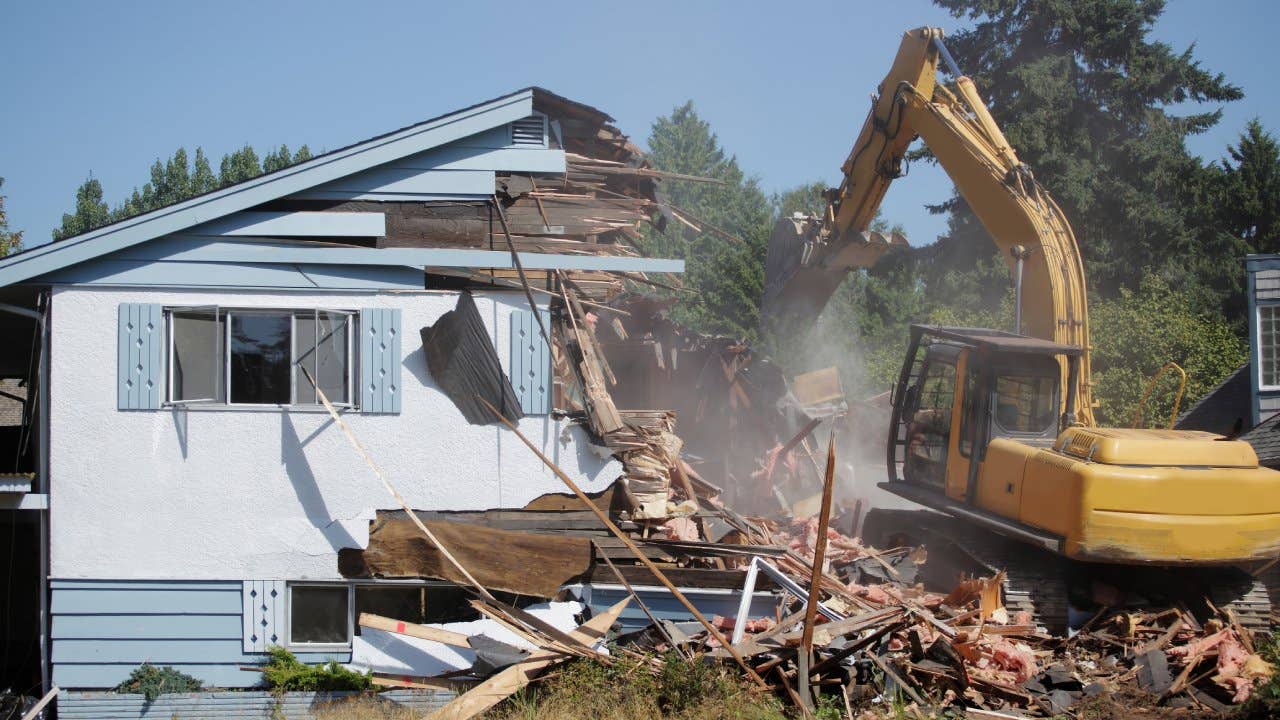Buying a house to tear it down

Ever wondered what it takes to buy a house and tear it down, either to rebuild as your dream house or just for the land? You’re not alone — but it can be a more expensive and bureaucratic process than you might think. From the cost of demolition to loan and permitting requirements, navigating the process can be overwhelming. Here’s everything you need to know about buying a tear-down (and actually tearing it down).
Financing a tear-down purchase
First things first: Let’s talk money. Financing a home purchase with the intention to destroy said home can be a serious challenge. For starters, if the house in question still has a mortgage on it, you cannot simply tear it down. Most mortgage agreements do not allow the borrower to demolish the home, because you’d be destroying the asset that secures the loan.
The strategy is not totally unheard of, though. For example, a couple in Marin County, California, bought a $4 million estate just to knock it down, because it blocked their view of the San Francisco skyline and Golden Gate Bridge.
Paying for the purchase in all-cash, if you can, solves the problem by eliminating the need for financing. If that’s not an option, some lenders might be willing to negotiate a deal using other collateral — your hopefully equity-laden current house, for example — or a combination of equity and cash.
Zoning restrictions to consider
Before you buy, think carefully about what you hope to do with the land after you tear down the house that sits on it. If a lot currently contains a single-family home, local zoning regulations could prevent you from building anything other than another single-family home there. So if you wanted to install, say, a pool or a tennis court or a detached garage, you could run into issues.
Zoning laws govern the type, size and location of buildings on any property, and in many areas, home rebuilds are restricted to the footprint of the original house. They may even restrict the height of a new house, meaning a single-level ranch home could not be replaced with a two-story structure. Getting the land rezoned so you can build something else might be possible, but it would likely slow the process to a crawl.
Additionally, be sure to check whether there is a homeowners association that governs the neighborhood. HOA bylaws can be even more restrictive than zoning ordinances, so tread carefully if so.
Consult with an experienced demolition contractor and city/county officials before buying a house you intend to tear down. Online research can also be very valuable here, so check your local government websites, and take a look at sites like TearDowns.com as well.
What permits are required to tear down a house?
If your zoning situation is squared away, it’s time to think about permits. You will likely need a lot of them. In most municipalities, a demolition permit is necessary to raze or remove a structure down to the foundation. Other types of city and/or county permits may need to be pulled as well.
Demolition permits vary based on location, and applications for them may need to include other permits, such as ones for plumbing, utilities and tree preservation, plus a grading plan and more. So if you plan a full demolition, you’ll need to apply for that permit as soon as possible to make sure you comply with local code provisions and have plenty of time to implement it. And if the house is in a historic district, expect far more red tape.
Your contractors should be able to guide you through the permitting process, or even handle it themselves.
How much does it cost to demolish a house?
Depending on where you live, demolition of a home that’s less than 2,000 square feet can range from $6,000 to more than $25,000, according to Angi.com. BobVila.com puts the national average cost of home demolition at $18,000.
Demolition costs can range from $4 to $17 per square foot. Prices will typically be higher in cities and lower in less populated or rural areas, and the more complex the structure is to tear down, the more expensive your total will be. The cost could be even higher if there are environmental issues involved, such as asbestos abatement.
Before the work could even get started, you’d first be required to send a letter to adjoining neighbors informing them of your plan. If there are objections, that could delay or even scuttle the process. Then the site must be fenced off and secured for safety and to contain construction dust or sediment. In addition to the city or county permits you’d need to pull, you can also expect sizable hauling and dumping fees. Utility infrastructure to the house would also have to be properly disconnected and terminated at the source.
Bottom line
Buying and demolishing a house can be expensive and require multiple permits. It also requires navigating complex zoning restrictions and loan negotiations, so it is important to consult with experienced professionals and local authorities before proceeding.
FAQ
-
Demolition typically ranges from $6,000 to $25,500 depending on the home’s size, location and layout. The national average is around $18,000. There will likely be fees for hauling and dumping debris as well.
-
Yes. Depending on your location, you will likely need to obtain various city or county permits to tear down a house, starting with a demolition permit. The permitting process can be lengthy, so allow yourself plenty of time and consult with your contractors to make sure you pull everything you need to get the job done in accordance with local regulations.
-
Local zoning regulations vary widely by location. They may prevent you from constructing certain structures on the land or may even specifically dictate what can and cannot be built. Additional restrictions may apply if the property is in a historical district or part of a homeowners association.
Why we ask for feedback Your feedback helps us improve our content and services. It takes less than a minute to complete.
Your responses are anonymous and will only be used for improving our website.
You may also like

‘We buy houses’ companies in Michigan

The cost of selling a house in New Jersey

Buying a home as-is: The pros and cons



